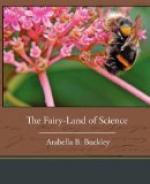Week 16
Lecture VI
THE VOICES OF NATURE AND HOW WE HEAR THEM
We have reached to-day the middle point of our course, and here we will make a new start. All the wonderful histories which we have been studying in the last five lectures have had little or nothing to do with living creatures. The sunbeams would strike on our earth, the air would move restlessly to and fro, the water-drops would rise and fall, the valleys and ravines would still be cut out by rivers , if there were no such thing as life upon the earth. But without living things there could be none of the beauty which these changes bring about. Without plants, the sunbeams, the air and the water would be quite unable to clothe the bare rocks, and without animals and man they could not produce light, or sound, or feeling of any kind.
In the next five lectures, however, we are going to learn something of the use living creatures make of the earth; and to-day we will begin by studying one of the ways in which we are affected by the changes of nature, and hear her voice.
We are all so accustomed to trust to our sight to guide us in most of our actions, and to think of things as we see them, that we often forget how very much we owe to sound. And yet Nature speaks to us so much by her gentle, her touching, or her awful sounds, that the life of a deaf person is even more hard to bear than that of a blind one.
Have you ever amused yourself with trying how many different sounds you can distinguish if you listen at an open window in a busy street? You will probably be able to recognize easily the jolting of the heavy wagon or dray, the rumble of the omnibus, the smooth roll of the private carriage and the rattle of the light butcher’s cart; and even while you are listening for these, the crack of the carter’s whip, the cry of the costermonger at his stall, and the voices of the passers-by will strike upon you ear. Then if you give still more close attention you will hear the doors open and shut along the street, the footsteps of the passengers, the scraping of the shovel of the mud-carts; nay, if he happen to stand near, you may even hear the jingling of the shoeblack’s pence as he plays pitch and toss upon the pavement. If you think for a moment, does it not seem wonderful that you should hear all these sounds so that you can recognize each one distinctly while all the rest are going on around you?
But suppose you go into the quiet country. Surely there will be silence there. Try some day and prove it for yourself, lie down on the grass in a sheltered nook and listen attentively. If there be ever so little wind stirring you will hear it rustling gently through the trees; or even if there is not this, it will be strange if you do not hear some wandering gnat buzzing, or some busy bee humming as it moves




